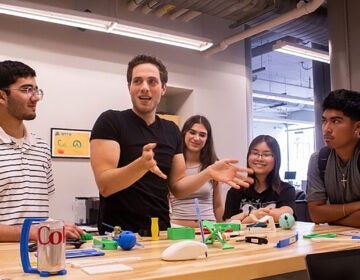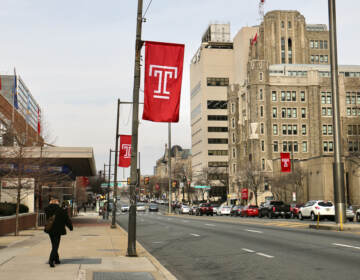With $1M state grant, Temple to address need for addiction meds in Philadelphia
The grant comes from a program trying to enlist more community-based primary care physicians in the fight against the opioid addiction.

Suboxone, an oral film prescribed for the medication-assisted treatment of opioid addiction and dependency, is pictured in this Tuesday, Feb. 21, 2017 photo. (Charles Krupa/AP Photo)
As the opioid addiction crisis continues, medications that help control cravings have proved more effective than behavioral therapy alone. But many treatment programs have yet to embrace the medications, and patients often have a hard time finding a doctor who can prescribe the evidence-based treatment.
Now, Temple University’s health system will use a $1 million grant from the state of Pennsylvania to expand access to state-of-the-art addiction treatment under a program that aims to make it easier to get medications such as buprenorphine — also known under the brand name Suboxone.
Temple’s grant comes from the the Pennsylvania Coordinated Medication Assisted Treatment program, or PAC-MAT, which is trying to enlist more community-based primary care physicians in the fight against opioid addiction. The grant will fund a new addiction clinic at Temple’s main hospital campus in North Philadelphia to serve as a hub of support for a network of doctors working in the surrounding communities.
“Medication-assisted treatment is not simply the act of writing a prescription,” said Susan L. Freeman, the chief medical officer of the Temple University Health System. “It’s really intervening with a treatment plan that addresses the patient as a whole.”
The challenge of providing that comprehensive care, Freeman said, helps explain why medication-assisted treatment still isn’t widely available. The new Temple Recovery Using Scientific Treatments Clinic — known as TRUST — will ensure that patients have access to “wrap-around services,” such as case managers, peer support, psychotherapy, and attention to their physical health.
Temple and two other providers receiving the latest round of grants now make a total of eight health systems across Pennsylvania to implement a “hub and spoke” model under the PAC-MAT program. The state’s secretary of health, Dr. Rachel Levine, said the program aims to deliver medication-assisted treatment to people struggling with opioid addiction regardless of where they live or their insurance coverage.
“We’re really looking to span urban areas, suburban and rural areas with this program, and now with the three new programs, including Temple, we go from Philadelphia to Pittsburgh,” Levine said.
Gail Groves Scott, manager of the Substance Use Disorders Institute at University of the Sciences, said Temple’s grant would help fill an unmet need for buprenorphine treatment in Philadelphia. Historically, the city’s Medicaid-funded system provided only methadone treatment, and buprenorphine was prescribed only by doctors taking private insurance or cash payments, Scott said. It was only in the last few years, she said, that the city has been working to ramp up capacity for treatment with buprenorphine. Patients can get a prescription for buprenorphine to take at home rather than having to travel to a clinic every day to get their dose, as with methadone.
Temple’s TRUST clinic, which will support at least 300 patients over the next eight to 10 months under the terms of the grant, intends to continue to build the program beyond that number, Freeman said.
Pennsylvania’s PAC-MAT program was a “step in the right direction,” said the University of the Sciences’ Scott, but she added there was another reason doctors and health systems have been reluctant offer medication-assisted treatment.
“It was a money loser,” she said. “The reimbursement is not adequate for the wrap-around services that patients need.”
Reimbursement rates would ultimately need to increase to get enough doctors on board, Scott said.
The state’s funding for the grants comes from the 21st Century Cures Act, federal legislation passed at the end of the Obama administration that provided for grants states can use to fight opioid addiction.
WHYY is your source for fact-based, in-depth journalism and information. As a nonprofit organization, we rely on financial support from readers like you. Please give today.





